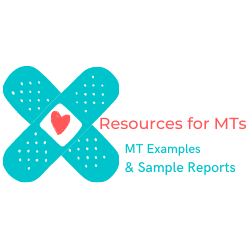Medical Transcription Tips and Hints For Medical Transcriptionists:
THE DIFFERENCE BETWEEN BNP AND BMP:
These two are commonly dictated in the lab data section of a medical report, When dictated, it is hard to discern whether it should be BNP or BMP. Most MTs would transcribe this as BMP regardless of what is dictated, primarily because they are more familiar with BMP as opposed to BNP. So, what is the difference between the two?
BNP (brain natriuretic peptide): This is a single test and has just a single value. This test measures the amount of BNP hormone in your blood. Normal levels of BNP are low, but if the patient has a heart condition such as heart failure, levels of BNP would be elevated.
BMP (basic metabolic panel): This consists of multiple tests and you would never have a single value dictated against BMP.
Example: The patient’s BNP level was 900. (It cannot be BMP since a single value is dictated)
Sounds like “rhonchorous.” Doc dictates “rhonchorous cough” and later on “rhonchorous” breath sounds. However, I cannot seem to reference “rhonchorous” in any reference source? Is there such a word?
Well, this is essentially a word made up by doctors and can be heard quite often in dictations. The meaning intended is quite clear and so it is fine to transcribe it as such. You can also find references to this word in Stedman’s Cardiovascular and Pulmonary Words, 4th Edition, as well as Stedman’s OB-GYN and Pediatric Words, 4th Edition.
HYPHENATE COMPOUNDS FORMED WITH THE PREFIX “SELF”
Some examples would be,
self-employed, self-administered, self-assured, self-inflicted, etc.
The correct word in this context is “cadaveric” – which relates to a dead body. In this instance, it just means a donor kidney derived from a dead person.
Sounds like – stool was “hemocculted” – Is this acceptable to transcribe?
What the doctor refers to here is the stool test “Hemoccult” with the “H” being capitalized as it is a brand name. However, in this instance, the doc had made up a word, which doesn’t exist and cannot be referenced in reference sources. However, the meaning intended is clear and hence the word can be transcribed pending further clarification from the client or doctor, as to how they want it handled. If they want the sentence to be rephrased so that the word transcribed is “Hemoccult,” then you can transcribe it like that in the future.
Should it be “disk” or “disc” when this is transcribed in orthopedic reports? Which one is correct?
The correct spelling/usage of this term has been the subject of much debate over the years. You’d find different answers depending on who you ask. So, what is the correct way to transcribe this term? Well, the general trend now is to use the spelling “disk” with regard to orthopedic use. For example, “lumbar disk.” When this term occurs in an ophthalmological context, the preference is to use the word “disc.” For example, “optic disc.” However, there is also a school of thought that advocates using the spelling “disk” across orthopedic and ophthalmologic contexts. Ultimately, unless the doctor/client/account specifics specifically state a preference, it is safe to transcribe “disk” in an orthopedic context and “disc” in an ophthalmological context.
TRANSCRIBING CONGESTIVE HEART FAILURE CLASSES:
While transcribing congestive heart failure classes, use Roman numerals.
Dictated: The patient was diagnosed with class 4 congestive heart failure.
Transcribed: The patient was diagnosed with class IV congestive heart failure.
